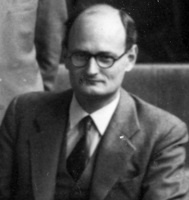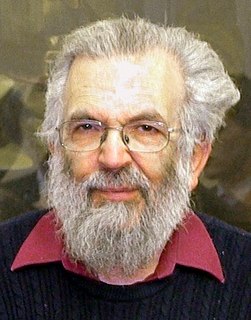Related Research Articles

Carl Ransom Rogers was an American psychologist and among the founders of the humanistic approach in psychology. Rogers is widely considered to be one of the founding fathers of psychotherapy research and was honored for his pioneering research with the Award for Distinguished Scientific Contributions by the American Psychological Association (APA) in 1956.

Psychotherapy is the use of psychological methods, particularly when based on regular personal interaction, to help a person change behavior, increase happiness, and overcome problems. Psychotherapy aims to improve an individual's well-being and mental health, to resolve or mitigate troublesome behaviors, beliefs, compulsions, thoughts, or emotions, and to improve relationships and social skills. Numerous types of psychotherapy have been designed either for individual adults, families, or children and adolescents. Certain types of psychotherapy are considered evidence-based for treating some diagnosed mental disorders; other types have been criticized as pseudoscience.

An intellectual is a person who engages in critical thinking, research, and reflection about the reality of society, and who proposes solutions for the normative problems of society. Coming from the world of culture, either as a creator or as a mediator, the intellectual participates in politics, either to defend a concrete proposition or to denounce an injustice, usually by either rejecting or producing or extending an ideology, and by defending a system of values.

Richard Mervyn Hare, usually cited as R. M. Hare, was a British moral philosopher who held the post of White's Professor of Moral Philosophy at the University of Oxford from 1966 until 1983. He subsequently taught for a number of years at the University of Florida. His meta-ethical theories were influential during the second half of the twentieth century.

Ronald David Laing, usually cited as R. D. Laing, was a Scottish psychiatrist who wrote extensively on mental illness – in particular, the experience of psychosis. Laing's views on the causes and treatment of psychopathological phenomena were influenced by his study of existential philosophy and ran counter to the chemical and electroshock methods that had become psychiatric orthodoxy. Taking the expressed feelings of the individual patient or client as valid descriptions of personal experience rather than simply as symptoms of mental illness, Laing regarded schizophrenia as a theory not a fact. Though associated in the public mind with the anti-psychiatry movement, he rejected the label. Politically, he was regarded as a thinker of the New Left. Laing was portrayed by David Tennant in the 2017 film Mad to Be Normal.

Humanistic psychology is a psychological perspective that arose in the mid-20th century in answer to two theories: Sigmund Freud's psychoanalytic theory and B. F. Skinner's behaviorism. Thus it was referred to as the "third force" in psychology. The school of thought of humanistic psychology gained traction due to key figure Abraham Maslow in the 1950s during the time of the humanistic movement. It was made popular in the 1950s by the process of realizing and expressing one's own capabilities and creativity.

John Lindley FRS was an English botanist, gardener and orchidologist.

Richard Henry Tawney was an English economic historian, social critic, ethical socialist, Christian socialist, and important proponent of adult education. The Oxford Companion to British History (1997) explained that Tawney made a "significant impact" in all four of these "interrelated roles". A. L. Rowse goes further by insisting that "Tawney exercised the widest influence of any historian of his time, politically, socially and, above all, educationally".
In ethics, value pluralism is the idea that there are several values which may be equally correct and fundamental, and yet in conflict with each other. In addition, value-pluralism postulates that in many cases, such incompatible values may be incommensurable, in the sense that there is no objective ordering of them in terms of importance. Value pluralism is opposed to value monism.

Jacob Levy Moreno was a Romanian-American psychiatrist, psychosociologist, and educator, the founder of psychodrama, and the foremost pioneer of group psychotherapy. During his lifetime, he was recognized as one of the leading social scientists.
Existential psychotherapy is a form of psychotherapy based on the model of human nature and experience developed by the existential tradition of European philosophy. It focuses on concepts that are universally applicable to human existence including death, freedom, responsibility, and the meaning of life. Instead of regarding human experiences such as anxiety, alienation and depression as implying the presence of mental illness, existential psychotherapy sees these experiences as natural stages in a normal process of human development and maturation. In facilitating this process of development and maturation, existential psychotherapy involves a philosophical exploration of an individual's experiences stressing the individual's freedom and responsibility to facilitate a higher degree of meaning and well-being in their life.

Peter Guy Winch was a British philosopher known for his contributions to the philosophy of social science, Wittgenstein scholarship, ethics, and the philosophy of religion. Winch is perhaps most famous for his early book, The Idea of a Social Science and its Relation to Philosophy (1958), an attack on positivism in the social sciences, drawing on the work of R. G. Collingwood and Ludwig Wittgenstein's later philosophy.

Joseph Raz is an Israeli legal, moral and political philosopher. He is one of the most prominent advocates of legal positivism and is well known for his conception of perfectionist liberalism. Raz spent most of his career as a professor of philosophy of law at the University of Oxford associated with Balliol College, and is now a part-time professor of law at Columbia University Law School and a part-time professor at King's College London. He received the Tang Prize in Rule of Law in 2018.

Environmental philosophy is a branch of philosophy that is concerned with the natural environment and humans' place within it. It asks crucial questions about human environmental relations such as "What do we mean when we talk about nature?" "What is the value of the natural, that is non-human environment to us, or in itself?" "How should we respond to environmental challenges such as environmental degradation, pollution and climate change?" "How can we best understand the relationship between the natural world and human technology and development?" and "What is our place in the natural world?" Environmental philosophy includes environmental ethics, environmental aesthetics, ecofeminism, environmental hermeneutics, and environmental theology. Some of the main areas of interest for environmental philosophers are:

Iris Marion Young was an American political theorist and socialist feminist who focused on the nature of justice and social difference. She served as Professor of Political Science at the University of Chicago and was affiliated with the Center for Gender Studies and the Human Rights program there. Her research covered contemporary political theory, feminist social theory, and normative analysis of public policy. She believed in the importance of political activism and encouraged her students to involve themselves in their communities.
Sebastian de Grazia (1917–2000) was an American author. Born in Chicago, he received his bachelor's degree and a doctorate in political science from the University of Chicago. During World War II he served in the Office of Strategic Services, predecessor to the Central Intelligence Agency, as an analyst. From 1962 to 1988 he taught political philosophy at Rutgers University. He received the 1990 Pulitzer Prize for Biography or Autobiography for his 1989 book Machiavelli in Hell. He is also the author of The Political Community (1948), Errors of Psychotherapy (1952), Of Time, Work, and Leisure (1962), and A Country with No Name (1997).
Richard Booker Brandt was an American philosopher working in the utilitarian tradition in moral philosophy.
Jeremy Holmes is a British psychiatrist and writer.
Anthony Ryle, was an English medical doctor. He studied at Oxford and University College Hospital, qualified in medicine in 1949. He worked as a General Practitioner in North London, then directed the University of Sussex Health service, and later worked as a Consultant Psychotherapist in St. Thomas' Hospital, London, from 1983 to 1992. While in general practice he realised that a lot of his patients were presenting with psychological problems or distress, which he confirmed by epidemiological studies. He developed interest in psychotherapy and later developed a time limited therapy which can be offered in the National Health Service. This type of therapy is known as cognitive analytic therapy. In the 1960s he moved to Kingston, on the outskirts of Lewes, East Sussex with his wife and four children.
John C. Norcross is an American professor, board-certified clinical psychologist, and author in psychotherapy, behavior change, and self-help.
References
- ↑ G. H. R. Parkinson, ed. (2012). An Encyclopedia of Philosophy. Routledge. p. 881. ISBN 9781134988167.